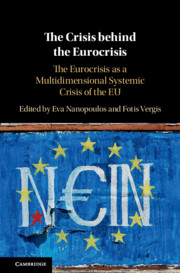Book contents
- The Crisis behind the Eurocrisis
- The Crisis behind the Eurocrisis
- Copyright page
- Dedication
- Contents
- Contributors
- Preface
- Acknowledgements
- Introduction The Elephant in the Room
- 1 There Is No (Legal) Alternative
- Part I The Crisis as a Crisis of the EU’s Identity
- Part II The Crisis as a Crisis of the EU’s Political and Democratic Legitimacy
- 5 Authoritarian Liberalism
- 6 The Inherently Undemocratic EU Democracy
- 7 Europe and Constituent Powers
- 8 ‘Who’s Afraid of the European Demos?’
- 9 Can Public and Voluntary Acts of Consent Confer Legitimacy on the EU?
- Part III The Crisis as a Crisis of the EU’s Economic Model
- Part IV The Crisis as a Crisis of the EU’s Social Character
- Part V Joining the Dots and the Way Forward
- Index
7 - Europe and Constituent Powers
Ruptures with the Neoliberal Consensus?
from Part II - The Crisis as a Crisis of the EU’s Political and Democratic Legitimacy
Published online by Cambridge University Press: 07 July 2019
- The Crisis behind the Eurocrisis
- The Crisis behind the Eurocrisis
- Copyright page
- Dedication
- Contents
- Contributors
- Preface
- Acknowledgements
- Introduction The Elephant in the Room
- 1 There Is No (Legal) Alternative
- Part I The Crisis as a Crisis of the EU’s Identity
- Part II The Crisis as a Crisis of the EU’s Political and Democratic Legitimacy
- 5 Authoritarian Liberalism
- 6 The Inherently Undemocratic EU Democracy
- 7 Europe and Constituent Powers
- 8 ‘Who’s Afraid of the European Demos?’
- 9 Can Public and Voluntary Acts of Consent Confer Legitimacy on the EU?
- Part III The Crisis as a Crisis of the EU’s Economic Model
- Part IV The Crisis as a Crisis of the EU’s Social Character
- Part V Joining the Dots and the Way Forward
- Index
Summary
The European project has perhaps never been more thoroughly disputed across the whole range of the political spectrum, than it is today. From the far left to the far right, the ongoing crisis is precipitating robust reactions, sometimes caught up in extremist and xenophobic rhetoric and at other times motivated by progressive egalitarian demands. This analysis explores the constitutional relevance of the above developments with a special focus on the constitutional facets of the main outcome of the crisis, austerity, and the response given by European societies.
Constitutional discourse on the European crisis often tends to emphasise the constitutional mutations and institutional shifts of power equilibrium within both the Union and its individual Member States. Within Member States, the strengthening of the executive power has almost become a leitmotif as the safeguarding of austerity under the pretence of necessity and at the expense of democracy informs parliamentary routine.
- Type
- Chapter
- Information
- The Crisis behind the EurocrisisThe Eurocrisis as a Multidimensional Systemic Crisis of the EU, pp. 156 - 172Publisher: Cambridge University PressPrint publication year: 2019



